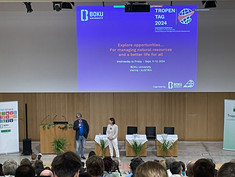Around 900 participants from 80 nations and 350 institutions attended the event on site and online to discuss these current and pressing global challenges in 70 sessions and 30 workshops. The conference, which was already hosted at BOKU in 2016, was organized by the Institute and Cluster for Development Research (IDR and CDR) and the Council for Tropical and Subtropical Research (ATSAF e.V.) in Germany. For over 15 years, CDR and IDR have been committed to the development of resilient and sustainable solutions in the tropics and subtropics. Andreas Melcher, from IDR/CDR and organizer of Tropentag 2024, described this work as follows: “We work closely with stakeholders from science, practice, civil society, politics and business to develop strategies that reduce global inequalities and address socio-ecological crises in a resilient way.”
Keynote speeches and scientific sessions
The 30 oral and 40 poster sessions focused on the urgent need for change in food and agricultural systems in rural areas. Sustainable and ecological farming was therefore just as much a topic as the protection of natural resources and the promotion of fairer value chains - an aspect that was also emphasized by Leonore Gewessler, Austrian Federal Minister for Climate Action, Environment, Energy, Mobility, Innovation and Technology in her welcoming address.
In her keynote speech, Anja Gassner, European Director of CIFOR-ICRAF, emphasized the critical role of forests and soils in climate protection. She highlighted that healthy ecosystems make a significant contribution to binding CO2 and strengthening biodiversity. The need for better communication between science, politics and society was particularly emphasized. Jennie Barron from SLU in Sweden underlined this and used case studies to show how agricultural production can be intensified in a sustainable way.
In her presentation, Johanna Jacobi from ETH Zurich criticized the persistent growth paradigm, that promotes overconsumption and the prioritization of luxury needs. Jacobi called for a paradigm shift in agricultural systems towards sufficiency and care and emphasized the central role of agroecology in soil regeneration and farmer autonomy. Johannes Waldmüller from the University of Vienna called for a rethink of sustainability approaches in the Global South. He highlighted indigenous concepts such as “sustainability from below” and emphasized the need for a deep, community-oriented transformation.
In her fascinating presentation, Lerato Thakholi from Wageningen University addressed the interactions between working conditions and nature conservation in South Africa. She questioned whether biodiversity conservation contributes to a better life or reinforces existing inequalities. Her analysis shed light on the complexity of nature conservation and the often disadvantaged role of workers. Nzula Kitaka from Egerton University addressed the need for clear goals, roles and strong scientific networks as models for overcoming crises.
Side events and workshops
The more than 500 scientific presentations were complemented by over 30 side events and workshops. Among others, scientists from ÖFSE and BOKU, along with representatives of BMEIA, OEAD and Foreign Trade Austria discussed strategies for implementing the SDGs. In this context, closer collaborations between policymakers and universities, through global partnerships at eye level, as reflected in the UniNetz and AfricaUniNet projects, were highlighted (see below for more information).
One workshop, organized in cooperation with the Maasai International Solidarity Alliance (MISA), IDR BOKU, ADA, Welthaus Graz, and Coventry University (UK), focused on the displacement of the Maasai in Tanzania. The workshop highlighted how conservation areas have led to the mass displacement of local Indigenous Peoples. Discussions critically examined neoliberal conservation approaches, often excluding local populations like the Maasai, and proposed decolonial alternatives that emphasize inclusive, equitable, and community-centered solutions.[Read more here]
Additionally, events like the Pastoralism Film Festival and the traditional photo competition were complemented by "Art in Science," an event organized in collaboration with international artists, ADA, OEAD, and IDR/CDR. Giovanna Chavez-Miguel and her team invited participants to explore the connections and synergies between art and science through interactive exhibits, workshops, and an agroecology film festival. The initiative highlighted the potential of art bridge diverse knowledge systems.
Sustainable Solutions for Global Challenges
Tropentag 2024 once again underscored the importance of transdisciplinary collaboration and innovative approaches in addressing global challenges and crises. The conference's findings and discussions will serve as a valuable foundation for urgently needed strategies and solutions. Parts of the event will soon be available on the BOKU YouTube channel.
Special thanks go to the BOKU Rectorate, numerous colleagues, and sponsors for their support of Tropentag 2024.
Scientific Contact
Priv.-Doz. DI Dr. Andreas Melcher
BOKU University
Institute of Development Research
Email: andreas.melcher@boku.ac.at
Phone: +43 1 47654 93411
Institute of Development Research BOKU
Links:
Austrian Foundation for Development Research
Giovanna Chavez Miguel - ART IN SCIENCE
Masaai Conservation Mission.indd

